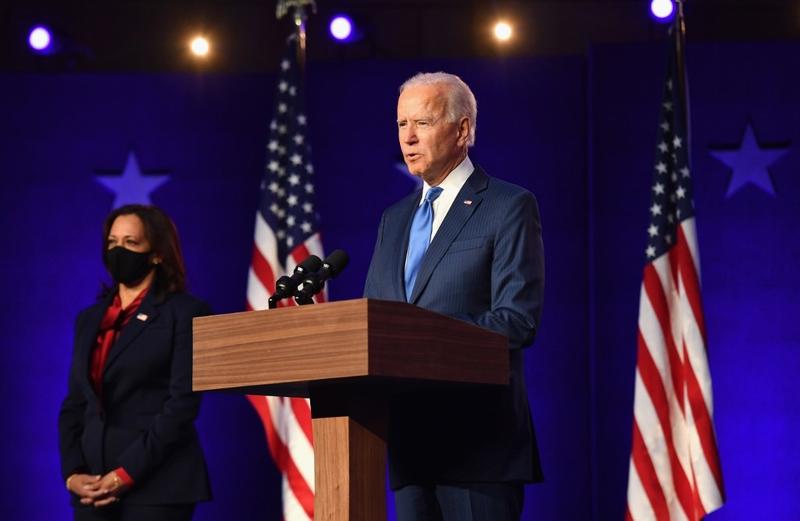 Democratic vice presidential nominee Senator Kamala Harris listens as Democratic presidential nominee Joe Biden delivers remarks at the Chase Center in Wilmington, Delaware, on Nov 6, 2020.
(ANGELA WEISS / AFP)
Democratic vice presidential nominee Senator Kamala Harris listens as Democratic presidential nominee Joe Biden delivers remarks at the Chase Center in Wilmington, Delaware, on Nov 6, 2020.
(ANGELA WEISS / AFP)
WASHINGTON - Democrat Joe Biden said Friday that he was going to win the US presidency as his lead grew over President Donald Trump in battleground
states, although television networks held off from declaring him the victor as officials continued to count votes.
"The numbers tell us ... it's a clear and convincing story: We're going to win this race," Biden said, adding that he and his running mate Kamala Harris were already meeting with experts as they prepare for the White House.
Biden's speech was originally planned as a victory celebration, but he changed his approach in the absence of an official call from television networks and other election forecasters.
Securing Pennsylvania's 20 electoral votes would put Biden over the 270 he needs to win the presidency after a political career stretching back nearly five decades
Still, it amounted to a blunt challenge to Trump, who kept out of view in the White House on Friday as Biden's lead grew in the four states that will decide the outcome: Pennsylvania, Georgia, Arizona and Nevada.
Leading Trump by 4.1 million votes nationwide out of a record 147 million cast, Biden said Americans had given him a mandate to tackle the coronavirus pandemic, the struggling economy, climate change and systemic racism.
"They made it clear they want the country to come together, not continue to pull apart," Biden said.
READ MORE: Biden moves ahead in Georgia and Pennsylvania
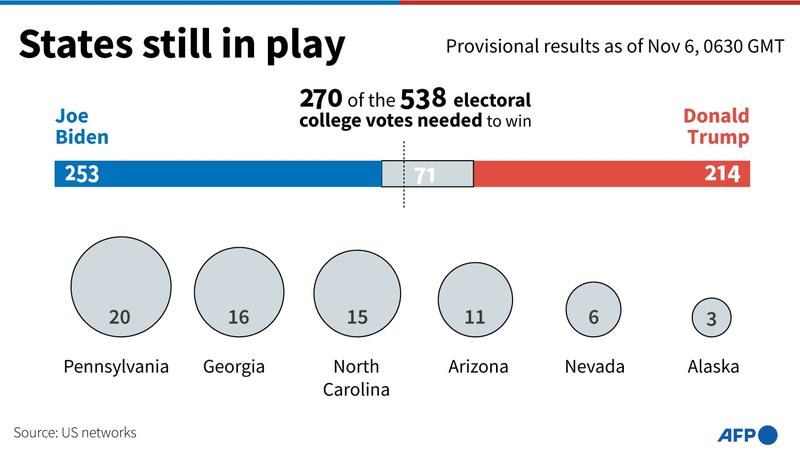
Trump remained defiant, vowing to press claims of fraud as a weary, anxious nation waited for clarity in an election that only intensified the country's deep polarization.
Republicans sought to raise US$6f0 million to fund lawsuits challenging the results.
The Trump campaign has already mounted several legal challenges related to vote counting in some battlegrounds and requested a recount in the Midwestern state of Wisconsin, which Biden has been forecast to win by a margin of less than one percentage point.
On the fourth day of vote counting, former vice-president Biden had a 253 to 214 lead in the state-by-state Electoral College vote that determines the winner, according to Edison Research.
Securing Pennsylvania's 20 electoral votes would put Biden over the 270 he needs to win the presidency after a political career stretching back nearly five decades.
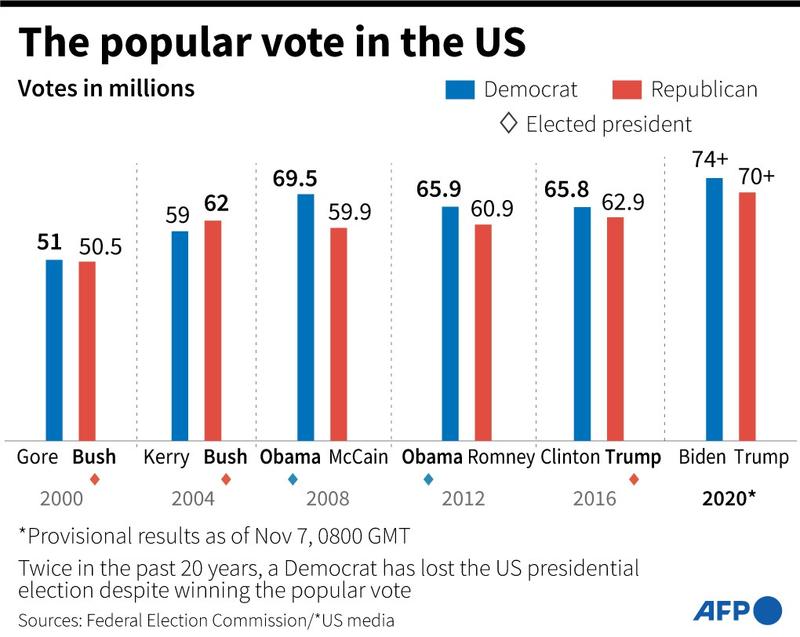
Biden would also win if he prevails in two of the three other key states where he was narrowly ahead on Friday: Georgia, Arizona and Nevada. Like Pennsylvania, all three were still processing ballots on Friday.
Nationwide, Biden led Trump by 4.1 million votes out of a record 147 million cast. However, his lead was much smaller in those four contested states: just 83,937 votes out of more than 16 million cast. In Georgia, he led by a mere 3,962 votes.
In the early hours of Saturday, Biden’s slim lead widened in Georgia to put him ahead by 7,248 votes with the count 99 percent complete.
In Pennsylvania, he led by 27,130 votes with 96 percent of the vote complete, while in Nevada, he led by 22,657 votes with 93 percent of the count complete. In Arizona, Biden’s lead narrowed to 29,861 votes with 97 percent of the tally completed.
With thousands of votes still to count, it was not clear when the contest would conclude.
Though the race failed to deliver the landslide that Democrats had hoped for, the party retained hopes of winning control of the US Senate in two Georgia run-off elections on Jan 5.
Edison Research said incumbent Republican Senator David Perdue would not reach 50 percent of the vote, forcing a run-off with Democratic challenger Jon Osoff. Incumbent Republican Senator Kelly Loeffler also will face Democrat Raphael Warnock on that day.
If Democrats win both seats that would give them at least 50 seats in the 100-seat chamber, enabling Biden's running mate, Kamala Harris, to cast tie-breaking votes.
That would make it harder for Republicans to block Biden priorities such as expanding healthcare and fighting climate change.
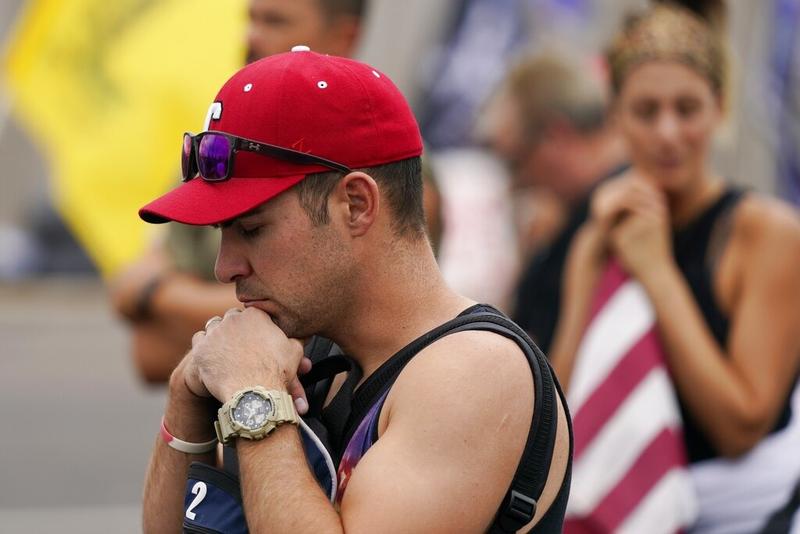 Supporters of US President Donald Trump pray at a rally outside the Maricopa County Recorder's Office, Nov 6, 2020, in Phoenix. (ROSS D. FRANKLIN/AP)
Supporters of US President Donald Trump pray at a rally outside the Maricopa County Recorder's Office, Nov 6, 2020, in Phoenix. (ROSS D. FRANKLIN/AP)
Division and demonstrations
"Whatever the ultimate outcome of this election, this is a deeply divided country along political and cultural lines alike," tweeted Richard Haass, president of the Council on Foreign Relations, a US think tank.
The tight race, appearing to reflect the deep political division in the United States, is also adding fuel to anxiety among Americans who are also concerned about what it will lead to.
Thousands of National Guard troops across the country have been activated to assist in the election and prepare for potential post-election violence, local media reported.
Also, demonstrations have taken place in many cities, including Washington, DC, New York, Philadelphia and Seattle, while protesters have sprung up outside polling places in states that have not yet been called.
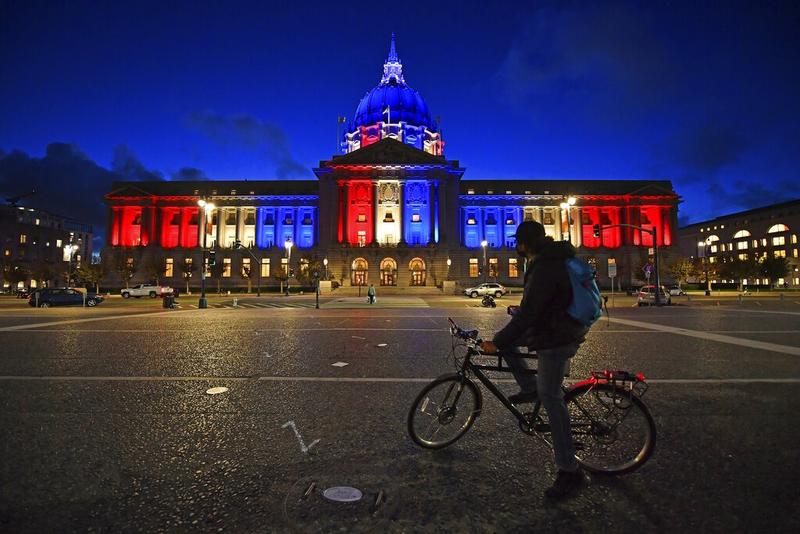 AP20312080228824.jpg
AP20312080228824.jpg
It was reported on Wednesday night that a group of people smashed windows of businesses in the downtown area of Portland, Oregon. Police arrested 12 people, including two on weapons charges.
ALSO READ: US watchdog 'probing Trump campaign's use of White House'
Oregon Governor Kate Brown has activated the National Guard to help maintain peace.
"Two groups gathered in downtown Portland last night," Brown said in a statement on Thursday. "Unfortunately, a second group of self-styled anarchist protesters, some armed, also marched downtown last night, with no discernible goal other than to cause violence and vandalism."
In Phoenix, Arizona, pro-Trump protesters, some of whom were armed, gathered outside a vote-counting center on Wednesday night, after Fox News called the "Grand Canyon State" in favor of Biden, which has drawn ire from the Trump campaign, as counting remains ongoing.
"We're on track to win Arizona. We only need to carry, I guess, 55 percent of the remaining vote," Trump said on Thursday.
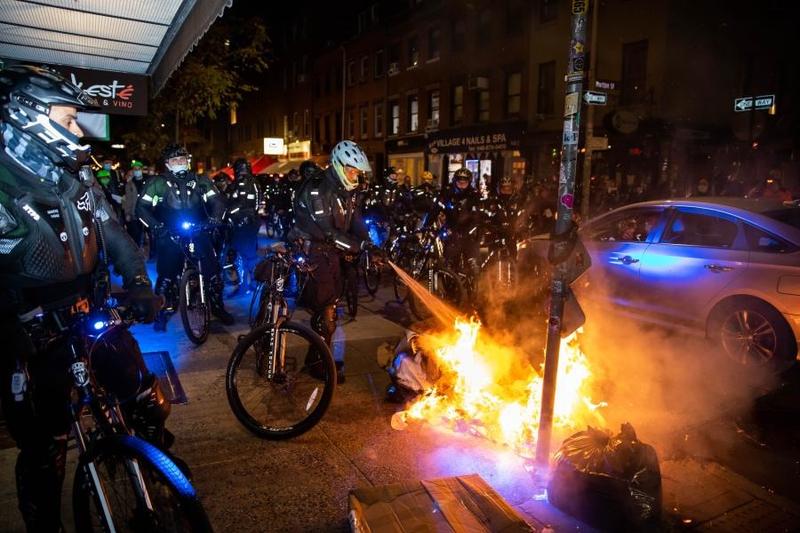 A policeman puts out a fire set by demonstrators during a protest about the presidential election in New York, the United States, Nov 4, 2020. (MICHAEL NAGLE / XINHUA)
A policeman puts out a fire set by demonstrators during a protest about the presidential election in New York, the United States, Nov 4, 2020. (MICHAEL NAGLE / XINHUA)
In cities across the country, many have been bracing themselves for possible civil unrest, with hotels, office buildings, coffee shops and restaurants boarded up.
"I think it's going to be a bit nerve-wracking to see how people act," a Washington, DC resident identifying himself as James told Xinhua after casting his ballot at a voting site on Tuesday.
"I'm hoping everything remains peaceful, and I hope it's a very clear victor," he said. "But I'm also prepared to stay inside for weeks."
Raging pandemic
As the vote counting drags on, the United States added a record-breaking 120,000-plus new COVID-19 cases in a single day on Thursday, setting a new milestone since the outbreak began in the country. Thursday marked the second day in a row the country recorded over 100,000 coronavirus cases.
As the vote counting drags on, the United States added a record-breaking 120,000-plus new COVID-19 cases in a single day on Thursday, setting a new milestone since the outbreak began in the country
Daily new confirmed coronavirus cases across the country have surged 45 percent over the past two weeks, to a record 7-day average of nearly 90,000, showed tallies compiled by Johns Hopkins University.
The raging pandemic has led to a record number of votes cast early before Election Day and sent by mail.
Biden has made the pandemic a central issue of his presidential bid and harshly criticized Trump's handling of the public health crisis, which has infected more than 9.6 million people in the United States, with nearly 235,000 deaths. The president has fiercely defended his response and measures and sought to shift blame elsewhere.
According to AP VoteCast, a national survey of the electorate, a majority of Biden voters -- about 6 in 10 -- said that the pandemic was the most important issue facing the United States, but Trump's supporters were more focused on the economy and jobs.
As the election continues to overwhelm other things, it remains unclear how the country will address the pandemic, which has become a partisan topic, as winter nears.
ALSO READ: US voters pin hope on next president to end pandemic, rifts
"We're in for a whole lot of hurt. It's not a good situation," Anthony Fauci, director of the US National Institute of Allergy and Infectious Diseases, said several days before Election Day. "All the stars are aligned in the wrong place as you go into the fall and winter season, with people congregating at home indoors. You could not possibly be positioned more poorly."
Fauci, a member of the White House coronavirus task force, also said the United States needs to make an "abrupt change" in its public health practices and behaviors, expressing concern that the White House is focusing on "the economy and reopening the country."


